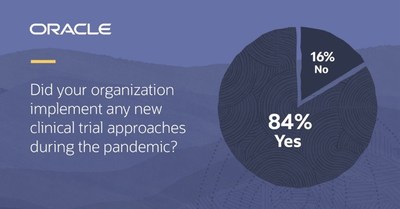Pandemic-Driven Changes in Pharma Here to Stay as New Clinical Trial Models Take Hold
A survey conducted by Oracle and Informa Pharma reveals significant shifts in clinical trial methods due to the COVID-19 pandemic. Of the 251 participants, 84% adopted alternative tactics to maintain trials, with 82% reporting positive impacts. Looking forward, 97% plan to continue using at least one new method, primarily remote monitoring and video visits. Nearly half noted more timely data access and enhanced patient flexibility. 92% expressed confidence in data quality from these innovations, indicating a shift towards decentralized clinical trials.
- 84% of respondents adopted alternative clinical trial methods during the pandemic.
- 82% reported positive impacts on clinical trials from these new methods.
- 97% plan to continue using at least one new method post-pandemic.
- 92% expressed equal or greater confidence in the data collected from new methods.
- None.
Insights
Analyzing...
AUSTIN, Texas, Oct. 25, 2021 /PRNewswire/ -- COVID-19 physical distancing requirements forced change in how traditional clinical trials were conducted and a new Informa Pharma and Oracle study shows the industry is not looking back. Of the 251 people surveyed,
"At the onset of the pandemic, the industry had to quickly adapt to keep trials afloat and this forced change helped researchers understand when and how to implement these approaches to improve clinical research," said Henry McNamara, senior vice president and general manager, Oracle Health Sciences. "Methods and technology that were being explored pre-pandemic have come front and center during the past 18 months. As clinical trials continue to evolve, study teams can rest assured that technology will help carry them into the future and speed new discoveries."
The survey, Clinical Trial Management in a Post-Pandemic World, polled participants from biopharmaceutical and medical device companies, as well as CROs involved in the operations and management of clinical trials from July to September 2021. Respondents, who were largely from North America and Europe, with others from APAC and other regions, were asked about changes made to their clinical trials during the pandemic, the effect of these adaptations, and the impact of these changes on the future of clinical trials.
Newly implemented trial methods bring benefits to trials and patients
Of the various methods noted,
The most common positive impacts of the alternative approaches adopted during the pandemic included more timely data access (
When asked about their confidence in the data generated by newly adopted approaches,
The study also found that improving the patient experience is a priority. Many respondents (
As the shift to decentralized trials continues, survey respondents expect their organizations to continue using hybrid (
"The COVID-19 pandemic challenged status quo and served as a catalyst for the adoption of the technology-enabled 'patient-centric' decentralized clinical trials model," said Dr. Nimita Limaye, research vice president, IDC. "As data overflowed from diverse sources, data collection models transitioned from 'discrete' data points to 'continuous' measures and from 'local optimums' to unified cloud-native platforms. The reality of this shift to the new norm has led to most of the industry planning on continuing to implement newer decentralized clinical trial models, with a significant reduction in the traditional site-based model. It is evident that patient optionality rules the day, with most organizations planning on giving patients the choice about how they participate in clinical trials."
To learn more about the study, join an in-depth webinar on the research and findings on October 26th here or download the full report here. Learn more about Oracle Health Sciences Clinical One here.
About Oracle Health Sciences
As a leader in Life Sciences cloud technology, Oracle Health Sciences' Clinical One and Safety One are trusted globally by professionals in both large and emerging companies engaged in clinical research and pharmacovigilance. With over 20 years' experience, Oracle Health Sciences is committed to supporting clinical development, delivering innovation to accelerate advancements, and empowering the Life Sciences industry to improve patient outcomes. Oracle Health Sciences. For life.
About Oracle
Oracle offers integrated suites of applications plus secure, autonomous infrastructure in the Oracle Cloud. For more information about Oracle (NYSE: ORCL), please visit us at oracle.com.
Trademarks
Oracle, Java, and MySQL are registered trademarks of Oracle Corporation.
![]() View original content to download multimedia:https://www.prnewswire.com/news-releases/pandemic-driven-changes-in-pharma-here-to-stay-as-new-clinical-trial-models-take-hold-301407054.html
View original content to download multimedia:https://www.prnewswire.com/news-releases/pandemic-driven-changes-in-pharma-here-to-stay-as-new-clinical-trial-models-take-hold-301407054.html
SOURCE Oracle









